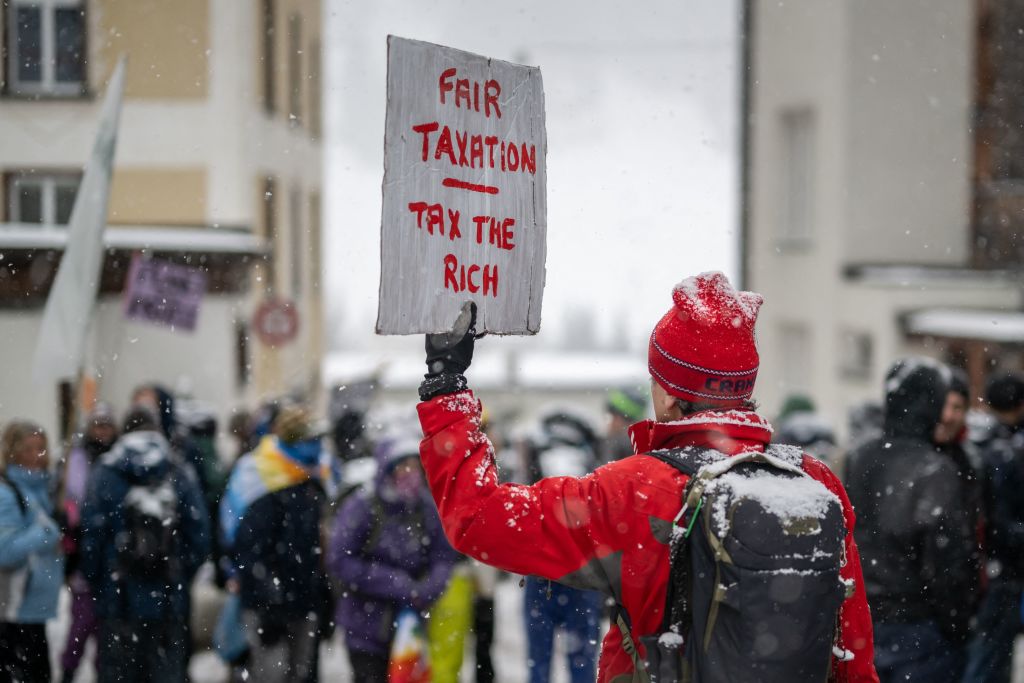The political and financial elite are gathered in Davos in Switzerland for the World Economic Forum’s (WEF) annual meeting, which starts today. Yet before the conference has even kicked off, the narrative around it has already been crafted: the WEF will have to pivot away from the free-market and globalist outlook Davos usually promotes, and switch its focus to inequality instead. In a cost-of-living crisis, images of the glamorous Swiss resort and delegates quaffing champagne are not a good look.
This problem was pre-empted by many. Neither Rishi Sunak nor his chancellor Jeremy Hunt will be attending this year’s conference (trade secretary Kemi Badenoch and business secretary Grant Shapps will be representing the government instead). In fact, only one G7 leader is expected to show up at Davos: German chancellor Olaf Scholz. Meanwhile, the lavish parties and extravagant features that have become synonymous with the conference are expected to be scaled back. The hope is that those attending the conference won’t appear ignorant to the current plight of the average onlooker. Oxfam is already out of the gates with its annual report on inequality, focusing this year on wealth gains since the pandemic and the cost-of-living crunch.
Last year’s Davos saw private jet emissions quadruple
But if there’s an issue with Davos’s image, it’s nothing new: the WEF’s annual knees-up has always had an image problem, and for a good reason. It is the picture-perfect example, not of free market capitalism, but of crony capitalism. Anyone who is seriously interested in liberalising markets – both to improve trade and to create the best condition for rising living standards – knows the last way to go about this is to put the world’s politicians and big business leaders in a resort town together. The deals which are struck between government and international companies – that can buy their way into the event – are far more likely to result in protectionist policies to keep the major players on top, making it harder for start-ups and smaller businesses to compete. Davos, for example, was one of the major forums where anti-competitive plans for a global minimum corporation tax was being pushed, before the G7 tried to formalise the idea in 2021.
Plans to scale back the public extravagances at this year’s conference make decent PR sense, but this won’t solve Davos’s big problem. Spouting platitudes about climate justice and inequality has become a regular feature of the conference, and the public has long seen through it. The conference’s claim to be ‘climate-neutral for the sixth consecutive year’, for example, does little to distract from how its attendees like to travel to the conference (the hypocrisy is only getting worse: last year’s Davos saw private jet emissions quadruple) as well as the greenwashing that takes place, as companies buy platforms to talk up their green credentials (there is actually a panel this year titled: ‘Don’t let greenwashing fears stall credible action’).
Oxfam’s inequality report is nothing new, either. It is published every year to promote wealth taxes (often with questionable calculations to produce headline figures, having in the past used methodologies that effectively considered a Harvard graduate with university debt to be poorer than a Chinese farmer). No doubt this year’s attendees will be quoting from it throughout the week, in an effort to appear sensitive and aware of the looming economic downturn. But the conference has long paid lip service to inequality, while doing little to tackle the deep roots of poverty and heavy-handed government policies that keep people at the bottom end of the income scale.
This year’s Davos theme is ‘cooperation in a fragmented world’ – a theme that ensures the really difficult topics won’t get discussed. The WEF is clearly determined not to rock the boat. But this is a missed opportunity: noting that free market capitalism is the tried-and-tested antidote to poverty is all but certain to be a no-go topic. For all the shift in optics, it would be a mistake to think the 2023 Davos is different from any other. Attendees are just slightly more aware of the image problem this year. Otherwise, the cronyism and hypocrisy are alive and well.







Comments